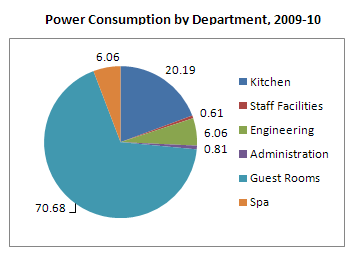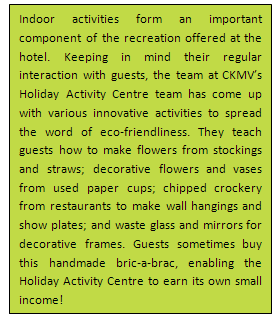The Club Mahindra Kodagu Valley (CMKV), Coorg was certified as a five-globe member of the ECOTEL Collection of Environmentally Responsible Hotels and Resorts in March 2010. This 62-unit, upscale holiday resort, located in the pristine valleys of Coorg, Karnataka, commenced operations in 2005 with 182 employees, and the firm resolve to be a responsible business operation that gives back to its environment and its community.
Although a new entrant into the ECOTEL league, the Club Mahindra Kodagu Valley is already displaying rare exuberance in the field of eco-management that belies its greenhorn status. At the CMKV, energy meters are fitted to each electrical panel, allowing for department-wise assessment of electricity usage and enabling the hotel to better manage its energy consumption. The sewage treatment plant, which was installed last year, generates enough treated wastewater to meet the hotel’s daily gardening requirements, while the generation of ozone, made possible through investment in an ozoniser, has reduced the usage of chlorine in the swimming pool by more than 80%. Club Mahindra’s commitment to environmentally-sustainable hotel practices derives from the hotel’s very identity as part of the Mahindra Group – a business that continues to take pioneering initiatives in areas such as green fuel technologies, biodiesel tractors, and the commercialization of energy-efficient heat pumps.
Particularly noteworthy about our subject hotel’s greening practices is the great attention to detail, which translates into a dedicated effort to reduce, reuse and recycle in every area and function of hotel operations. Oil used in the hotel’s Spa, for example, is collected and reused in the hotel’s bonfires, while feedback forms presented to guests using the Spa, as well as the feedback holder, are made of recycled paper and cardboard. Company cars are washed using the bucket, and not the hosepipe, and staff identity cards are no longer being laminated. Staff month-end prizes are given away in newspaper bags made in-house.
The hotel’s environmentally-friendly initiatives are discussed in more detail in the following section, under ECOTEL’s Five Globes: Water Management, Energy Management, Solid Waste Management, Employee Education and Community Involvement, and Environment Commitment.
Water Management
- Taps all across the resort feature aerators and are fitted with sensors, to ensure that water is used as efficiently as possible. In addition to featuring dual flush systems (6-litre and 3-litre), pressmatic urinal sensors are fitted to the toilets.
- Wastewater is treated in the hotel’s sewage treatment plant, which supplies the daily 111 kilolitres (approximately 29,324 US gallons) of water required for gardening. The hotel’s undertakes rainwater harvesting, and four harvesting pits are currently in use.
- Linen is changed only on alternate days (with the guest’s permission); the Water Conservation Card, placed in guest bathrooms, serves as a gentle reminder that this precious resource be used judiciously.
- Plates are not washed under running water, and all F&B Production staff is required to strictly adhere to the three-sink method for pot wash.
- It is an ingrained practice in all members of the F&B Service team to politely ask guests before refilling their water glasses.
- F&B Service uses glass jugs in banquets and conference halls instead of water bottles; in the F&B outlets, guests are asked if they would prefer a 1-litre bottle of mineral water instead of 500-ml bottles.
 Energy Management
Energy Management
- Each electrical panel PCC and MCC is fitted with a digital energy meter and consumption in each area is recorded on a daily basis.
- Electronic chokes are used in tube lights, which have a longer lifespan and result in a 11-watt (11-W) saving when compared to conventional copper chokes.
- Electronic dimmers, which serve the purpose of increasing the lifespan of light bulbs, are used in banquet halls, restaurants and the lobby area. CFLs are used for pathway lighting and street lighting, and have replaced the halogen bulb wherever these were installed.
- The use of timers for pathway lights and street lighting further contribute towards the hotel’s energy-saving measures. In the kitchen, heavy equipment like exhaust hoods also work on timers.
- In the Spa, the only lighting used is LED. Another conservation effort is the use of canon kinetiser for heating oil, which uses 60% less energy than normal hot plates.
|
Energy-efficient Equipment/Fittings |
Saving |
|
|
Two solar lights have been installed in the car parking area and each solar light produces 11-W by LED. Cost of the solar lights = Rs 25,000 |
Halogen lights installed in the car park would have consumed an estimated 500 W in one hour. For each solar light, per day saving = 6 KwH ( 6 units) Annual saving = 6 units * 30 days * 12 months * Rs 7/unit Saving = Rs15,120/year for each solar light = Rs 30,240/year for both solar lights |
|
|
Solar Water Heater Cost of the solar water heater = Rs 23,40,000
|
Provides 200 to 300 litres of hot water a day, which translates into a saving of 360 units/day. Annual Saving = 360 * 30 days * 12 months * Rs 7 /unit Saving = Rs 9,07,200/year |
|
|
CFL lamps in place of halogen lights |
148 halogen lights have been replaced, resulting in a total saving of 2,084 KwH/month. Annual Saving = 25,008 KwH/year = 25,008 ÷ 3 = 8,336 units/year# Saving = 8,336 units/year * Rs 7/unit = Rs 58,352/year #Loads and units consumed are divided by 3, as CFLs, halogen lamps and incandescent bulbs are connected to 3 phases and a common neutral wire |
|
|
CFLs in place of incandescent lights In 2009-10, 400 incandescent lights (60W) were replaced by CFLs (10W) |
Electricity consumed by Incandescent bulb ((400 * 60W * 8 hours) ÷ 1000)) ÷3 = 64 KwH# Electricity consumed by CFL ((400 * 10W * 8 hours) ÷1000)) ÷3 = 10.67 KwH# Per day saving = 53 KwH Saving = 53 KwH* 365 *Rs 7 = Rs 1,35,415/year |
|
|
Electronic choke At present, 225 electronic chokes are being used in the hotel. |
(225 * 11 W *12 hours)/1000 = 29.7 KwH Per day saving = 30 KwH Saving = 30 * 365= 10,950 KwH = 10,950 units 10,950 * Rs7 = Rs 76,650/year |

Solid Waste Management
- The proper segregation and disposal of waste is mandatory for all staff. All kitchen waste is carefully segregated according to the four-bin system (Black for wet garbage, White for dry garbage, Green for recyclable material, Red for non-recyclables) and food waste is sent for composting to the hotel’s vermiculture pits or to a piggery.
- Edible garnishes are used extensively. The use of silver foil, cling wrap and thermocol is banned from use in F&B Service.
- Slates, made in-house, are used as buffet tags, thereby reducing usage of paper tags.
- Bath and shower gel dispensers have been introduced in rooms to reduce wastage, and shower caps are given to guests only on request.
- Reuse of box files, flat files, used paper and envelopes is followed through meticulously, by the Administration and Finance departments (its largest users), as well as throughout the back-of-the-house. Laundry bags, ziplock bags, pencils and scribbling pads are similarly reused and not thrown away.
- Towels no longer fit for guest use are not discarded by staff of Housekeeping and the Spa, but are reused as dusters.
Employee Education and Community Involvement
- Weekly ECOTEL briefings ensure that staff is kept up-to-date with the hotel’s sustainability practices and remain attentive to new opportunities to reduce, reuse and recycle. For internal communication, emails are used extensively.
- Through regular training sessions, CMKV is educating vendors about the harmful effects of plastic and thermocol and encouraging them not to use these materials for packaging. Suppliers to CMKV have been asked not to use thin plastic covers for packaging fruits and vegetables and to reuse containers and bags used for other supplies.
- Guests are central to CMKV’s greening effort, and staff is motivated and empowered to involve guests through the Holiday Activity Centre and activities such as tree planting.
- The hotel, in addition to supporting and inculcating environment awareness among panchayat-run schools in the local community, provides financial support to the special needs section of the Bharatiya Kodagu Vidyalaya.
Environment Commitment
- Jute twine, instead of plastic twine, is used for document binding and bundling. The hotel’s chefs use cloth caps and not paper caps.
- The use of carbon paper has been eliminated, through the introduction of self-carbonated bill and voucher books and by maximizing the use of system-generated receipts.
- Prakriti, the kitchen garden where herbs and vegetables are grown, is an effort that all F&B team members are proud of.
- Cut flowers are not used anywhere in the hotel. The lobby features dry flower arrangements and the traditional rangoli is made using salt decorations instead of flowers. In the Spa, for example, the emphasis is on bamboo plants, which need no pesticide and which also add to the atmosphere of calm and relaxation in this space.
A visit to the hotel’s back-of-the-house, and one cannot help but observe the energy and enthusiasm with which team members go about their daily tasks, whether it be maintaining a roster of preventive maintenance work, or simply switching off lights when not in use. As CMKV employees themselves admit, “eco-friendly behavior” is now a way of life with them; an attitude and an approach that they “take back home from work every day”. Now a partner with ECOTEL, Club Mahindra can share its rich experience with other hotels on the path towards sustainable operations, and in turn benefit from ECOTEL’s know-how in the area of green hotel practices.

0 Comments
Success
It will be displayed once approved by an administrator.
Thank you.
Error